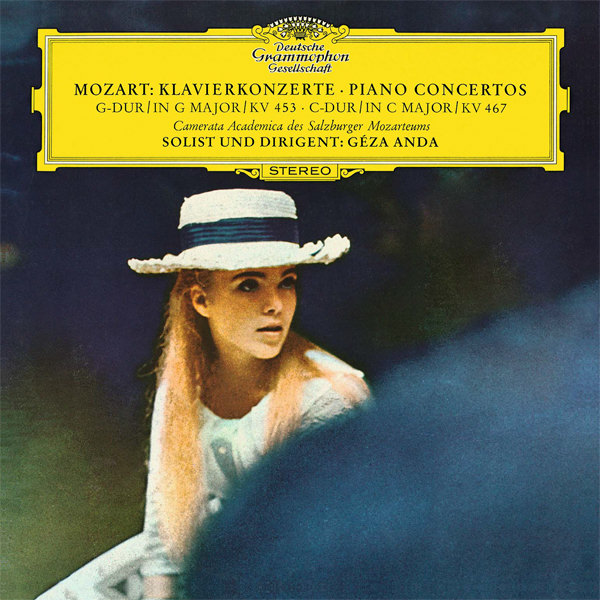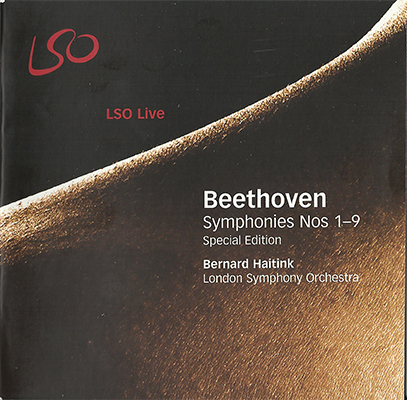
Wolfgang Amadeus Mozart – Piano Concertos Nos. 6, 17 & 21 – Geza Anda, Camerata Academica des Mozarteums Salzburg (1962/2016)
FLAC (tracks) 24-bit/96 kHz | Time – 01:18:51 minutes | 1,45 GB | Genre: Classical
Studio Master, Official Digital Download – Source: HDTracks | Booklet, Front Cover | © Deutsche Grammophon
Recorded: Tracks #1-6 – May 1961, #6-9 – April 1962, Grosses Festspielhaus, Salzburg, Austria
Although he played very little Mozart in his early career Géza Anda became the first pianist to record the full cycle of Mozart’s piano concerti; he recorded them between 1961 and 1969, conducting himself from the keyboard. His performance of the Andante from Mozart’s Piano Concerto No. 21 in C on the soundtrack of the 1967 film Elvira Madigan led to the epithet “Elvira Madigan” often being applied to the concerto. Indeed his performance of this work is generally considered the benchmark recording; he plays artistically, full of emotion and the orchestra supports him wholeheartedly. His performance of the 17th concerto is also superb and the 6th is equally pleasing.
Géza Anda was born in Budapest on November 19, 1921. He studied with Ernst von Dohnányi and Zoltan Kodály at the Budapest Academy of Music, and won the Liszt Prize in 1940. A year later, shortly after playing Brahms under Mengelberg, he made his debut in the Berlin Philharmonie, where Furtwängler dubbed him “the troubador of the piano”. He was only 20 – and had already begun to teach piano. In 1943 he settled in Switzerland. From 1953 to 1955 he gave a masterclass at the International Summer Academy of the Mozarteum in Salzburg, and in 1960 he succeeded Edwin Fischer as director of the Lucerne masterclasses. From 1969 he taught in Zürich. He died on 13 June 1976. Three years later, the first Concours Géza Anda was held, with the aim of encouraging a younger generation of pianists to develop in Anda’s spirit.
Anda’s early bravura displays in the Liszt, Franck, Tchaikovsky and Rakhmaninov repertoire, his pioneering Bartok interpretations, and his brilliantly captivating Chopin – all had the same power of expression as his performances of the German Romantics. His musical, technical and spiritual insights were based on a forging of form and substance within each work, as notable in Beethoven as in Schubert, Schumann and Brahms. It was this approach that gave Anda’s playing its renowned clarity; it lay at the heart of his “festive temperament”. Thanks to Clara Haskil’s encouragement, it also influenced his approach to Mozart.
From 1952 until his death, Anda made a solo appearance every year at the Salzburg Festival – a record matched by no other concert artist in Mozart’s birthplace. He directed Mozart concertos from the keyboard with the Camerata Academica, and took it on tour. With the same ensemble he became the first interpreter to record all Mozart’s piano concertos, an achievement which brought him numerous gramophone awards. For 16 of the 27 concertos, Anda wrote his own cadenzas.
Géza Anda’s repertoire matched the breadth of his public. What people heard was a style of playing that struck to the human core of all great music.
Tracklist:
Wolfgang Amadeus Mozart (1756 – 1791)
Piano Concerto No.17 in G, K.453 / Cadenzas: W. A. Mozart
1. 1. Allegro (Cadenza: K.624/22) 12:23
2. 2. Andante (Cadenza: K.624/24) 10:39
3. 3. Allegretto 7:43
Piano Concerto No.21 in C, K.467
4. 1. Allegro maestoso – Cadenza: Géza Anda 14:05
5. 2. Andante 7:15
6. 3. Allegro vivace assai – Cadenza: Géza Anda 6:25
Piano Concerto No.6 in B flat, K.238
7. 1. Allegro aperto 7:17
8. 2. Andante un poco adagio 6:04
Cadenza: Géza Anda
9. 3. Rondeau (Allegro) 6:55
Personnel:
Géza Anda, Piano and Conductor
Camerata Academica des Mozarteums Salzburg
Download:
mqs.link_MzartPianCncertsNs.61721CamerataSalzburgGzaAnda19622016HDTracks2496.part1.rar
mqs.link_MzartPianCncertsNs.61721CamerataSalzburgGzaAnda19622016HDTracks2496.part2.rar



















![Geza Anda, Camerata Salzburg - Mozart: Piano Concertos Nos. 20-23 by Géza Anda (2025 Remastered, Salzburg 1961-1964) (2025) [FLAC 24bit/96kHz] Geza Anda, Camerata Salzburg - Mozart: Piano Concertos Nos. 20-23 by Géza Anda (2025 Remastered, Salzburg 1961-1964) (2025) [FLAC 24bit/96kHz]](https://imghd.xyz/images/2025/02/09/g1irbcedoxchb_600.jpg)
![VA - Woodstock 50: Back To The Garden: The Anniversary Experience Day 2 (2019) [FLAC 24bit/48kHz] VA - Woodstock 50: Back To The Garden: The Anniversary Experience Day 2 (2019) [FLAC 24bit/48kHz]](https://getimg.link/images/imgimgimg/uploads/2019/12/iGXe3p9.jpg)
![Geza Anda - The Telefunken Recordings (2015) [FLAC 24bit/96kHz] Geza Anda - The Telefunken Recordings (2015) [FLAC 24bit/96kHz]](https://getimg.link/images/imgimgimg/uploads/2017/11/AkYqJq0.jpg)
![Combattimento Consort Amsterdam, Jan Willem de Vriend - Handel: Concerti grossi Op. 3 (2005) [nativeDSDmusic DSF DSD64/2.82MHz] Combattimento Consort Amsterdam, Jan Willem de Vriend - Handel: Concerti grossi Op. 3 (2005) [nativeDSDmusic DSF DSD64/2.82MHz]](https://getimg.link/images/imgimgimg/uploads/2018/12/1IGUAzV.jpg)
![Glenn Gould - The Complete Columbia Album Collection (2015 Remastered Edition) [Qobuz FLAC 24bit/44,1kHz] Glenn Gould - The Complete Columbia Album Collection (2015 Remastered Edition) [Qobuz FLAC 24bit/44,1kHz]](https://getimg.link/images/imgimgimg/uploads/2017/07/2bHwfbA.jpg)
![Géza Anda, Karl Böhm - Géza Anda plays Brahms and Mozart - Two legendary recordings (2024) [FLAC 24bit/48kHz] Géza Anda, Karl Böhm - Géza Anda plays Brahms and Mozart - Two legendary recordings (2024) [FLAC 24bit/48kHz]](https://imghd.xyz/images/2024/06/11/riof0path8hgb_600.jpg)
![Robert Casadesus, Géza Anda, Clara Haskil, Nathan Milstein, Herbert von Karajan, Schweizerisches Festspielorchester, Philharmonia Orchestra - Herbert von Karajan - The Early Lucerne Years (2023) [FLAC 24bit/48kHz] Robert Casadesus, Géza Anda, Clara Haskil, Nathan Milstein, Herbert von Karajan, Schweizerisches Festspielorchester, Philharmonia Orchestra - Herbert von Karajan - The Early Lucerne Years (2023) [FLAC 24bit/48kHz]](https://imghd.xyz/images/2023/09/13/dxocpphriy1hb_600.jpg)
![Geza Anda, Wolfgang Schneiderhan, Pierre Fournier, Janos Starker, Radio-Symphonie-Orchester Berlin, Ferenc Fricsay - Beethoven, Brahms: Triple & Double Concertos (1961/1962/2016) [Qobuz FLAC 24bit/96kHz] Geza Anda, Wolfgang Schneiderhan, Pierre Fournier, Janos Starker, Radio-Symphonie-Orchester Berlin, Ferenc Fricsay - Beethoven, Brahms: Triple & Double Concertos (1961/1962/2016) [Qobuz FLAC 24bit/96kHz]](https://getimg.link/images/imgimgimg/uploads/2018/01/6rXTfDs.jpg)

![Carl Nielsen - Symphonies Nos. 1-6 - London Symphony Orchestra, Sir Colin Davis (2015) [Blu-Ray Pure Audio Disc + DSF Stereo DSD64/2.82MHz] Carl Nielsen - Symphonies Nos. 1-6 - London Symphony Orchestra, Sir Colin Davis (2015) [Blu-Ray Pure Audio Disc + DSF Stereo DSD64/2.82MHz]](https://getimg.link/images/imgimgimg/uploads/2015/09/Wnf48VE.jpg)
![Max Emanuel Cencic - Handel: Ottone, HWV 15 (2017) [Qobuz FLAC 24bit/96kHz] Max Emanuel Cencic - Handel: Ottone, HWV 15 (2017) [Qobuz FLAC 24bit/96kHz]](https://getimg.link/images/imgimgimg/uploads/2017/11/9uXCAkQ.jpg)
![Rachel Podger, Gary Cooper - Mozart: Complete Sonatas for Keyboard & Violin (2004-09) [DSF DSD64/2.82MHz] Rachel Podger, Gary Cooper - Mozart: Complete Sonatas for Keyboard & Violin (2004-09) [DSF DSD64/2.82MHz]](https://getimg.link/images/imgimgimg/uploads/2018/08/CtydJ1g.png)
![Pacifica Quartet - Dmitri Shostakovich and his Contemporaries: The Soviet Experience Vol. 1-4 (2011-2013) [24bit FLAC] Pacifica Quartet - Dmitri Shostakovich and his Contemporaries: The Soviet Experience Vol. 1-4 (2011-2013) [24bit FLAC]](https://getimg.link/images/imgimgimg/uploads/2017/07/ntIbtOp.jpg)
![Maria Callas - Remastered The Complete Studio Recordings 1949-1969 (2014) [Qobuz FLAC 24bit/96kHz] Maria Callas - Remastered The Complete Studio Recordings 1949-1969 (2014) [Qobuz FLAC 24bit/96kHz]](https://getimg.link/images/imgimgimg/uploads/2018/12/Vw7IHlv-1.jpg)
![Yannick Nezet-Seguin, Miah Persson, Chamber Orchestra of Europe - Mozart: Cosi fan tutte, K588 (2013) [FLAC 24bit/96kHz] Yannick Nezet-Seguin, Miah Persson, Chamber Orchestra of Europe - Mozart: Cosi fan tutte, K588 (2013) [FLAC 24bit/96kHz]](https://getimg.link/images/imgimgimg/uploads/2018/06/AtEbnen.jpg)